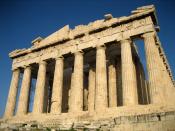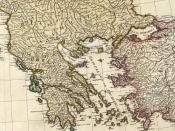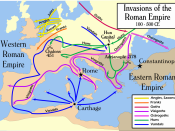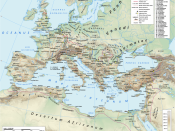The Role and Status of the Actor from Classical Greek to Medieval European Society
By Alexander Griffin
Actors throughout the ages have had a raw deal, sometimes held in high esteem at other times driven underground by their native states who wish to silence them. However in ancient Greece actors were often looked upon as the most fundamental part of society and often formed their own guilds. They were tools of the state, Used to inform the general public of their moral duties to one another and to their society, much like television does in our modern times.
It is commonly thought that the Arts first saw light in Greece as ceremonial libations to the deities. These took the form of poetry and dance which was believed to be pleasing to the gods especially Dionysus. However in The Witches' Bible by Janet and Stewart Farrar, it discusses the use of improvised dance and rhyme to affect the physical consciousness's awareness during magical rites; "power is latent within the body and may be drawn out and used in various ways by the skilled⦠the simplest way is by dancing and singing monotonous chantsâ¦" With this in mind it could be said that the theatre actually stemmed from an occult back ground.
This is even more plausible when you take into account that within the Ancient Greek belief system gods where not held in the same reverence as that of the God feared by Christians. They where entities that where to be bartered with to gain your own ends. This in its basic form is the practice of ceremonial magic through the use of necromancy, and is therefore possibly the origin of both Greek libations and performance.
Around 600bce Greek performances took on a different form from the religious context they where used for during ceremony. Peisistratus, the then leader of Athens authorised a competition to be held in the spring to honour Dionysus. The tragedies performed at this point where still centred mainly with Greek religious beliefs; however by 510bce when the democratic state of Athens was formed by Cleisthenes, it started to look at the politics of the state and the society in general.
In many respects the Actor in Greek society were the newsreaders of their days. They were vessels that the government would use to promote propaganda and knowledge of their citizens moral obligations to the state and their community by the use of entertainment to aid in its assimilation by the masses. A by product of there high esteem meant that some actors could share in some of the greatest honours of the Athenian elite like becoming Ambassadors who because of their ability to use rhetoric where sent as envoys to other city states or polis's. Further more some actors where also allowed to wear the colour purple in civic processions, this colour was reserved purely for the ruler of the state on account of the difficulty in acquiring the materials to make the dye.
Although in 250bce Athens was under the jurisdiction of Macedonia, the Romans adopted the performances created by the Greeks as a model for their entertainment of the masses. However over time the popularity of the tragedies diminished and comedy or the 'Fabula Palliata' rose up in its absence.
The dawning of the Roman Empire in C500bce brought about great changes in the Mediterranean. By c130bce Rome had swept through the surrounding areas and made the people of the once sovereign states into subjects of the Roman Empire. Although their conquerors imposed roman jurisdiction upon them, Rome also absorbed many of their new colonies social and cultural achievements.
In Rome the actors had very little social status, most of them where slaves who would be flogged if their performance was lacking. In the early parts of the current era before Christianity was adopted as the national religion of the state, Christians would often be used if the script called for a person to be crucified. Historians and critics have described Roman theatre as debaucherous and crude. This is possibly because the Romans wanted realistic drama, men no longer played the female roles and like the crucifying of Christians, if the story called for the showing of flesh the actors showed the public their flesh.
Upon the opening of the coliseum, the theatre gradually lost its popularity in favour of the games and entertainment provided at previously mentioned amphitheatre. Although the gladiators who performed there were not technically classed as actors in the traditional sense, they did provide spectacle for the audience by enacting notorious battles, and therefore it could be argued that they were actors. They themselves had no substantial public status however if they performed their job well, unlike actors (in the traditional sense) they would often find themselves to be doted upon by the viewing public.
Although the Emperor Justinian married an actress, in around 337ce he closed the theatres, sources state that this was because he believed them to be crude and immoral. However part of the reason was because Rome was under constant attack from Germanic tribes and funds where already starting to run low. The actors didn't just disappear, many took to the road in search of households who could afford their services as entertainers, whether they juggled or amused people with their witty and secular performances is greatly unknown, however it is plausible that as well as the name circus, the type of performances we would in modern times associate with the name actually originated at the fall of the roman empire when troops of actors would travel around showing what ever their audience wanted to pay for.
Unfortunately Rome was the precursor to the downfall of the reputation of the actor. During Rome's rein in the Mediterranean and Europe, the theatre took on such a grotesque persona which after the official fall of Rome in 476ce, the Christian church on regular occasions during the Dark Ages chose to denounce actors in their council records.
Little else is known about what actors did during the dark ages, in fact some historians would have us believe that actors simply were not around during these times. However tangible evidence has been documented by churches throughout Europe during this 500yr period. They have provided us with the proof that actors did not just disappear, whether it was a criticism about how they supported themselves through nefarious means or a jab about how they were too crude and vulgar to be considered children of the then accepted Christian God, they were spoken about in church records and have given us the insight to clearly state that the actors during this age although free of bondages where not looked upon by the church at least; as being 'suitable role models' for the general public.
In parts of Europe Actors where banned from wearing the vestments of the clergy, which suggests that they had been taking retaliatory punches at the established faith by mimicking figures of the church.
In Damascus at around 780ce a clergymen wrote that 'secular drama was a rival to the mass in church'. With this in mind, the church embarked in a popularity contest with actors. They recognised that the Mass could never win the attention of the public while it remained intangible to all but those who spoke Latin, so they set about opening the doors of understanding. They allowed and promoted clerics to illustrate what was being said in mass, with the medium of performance in the local vernacular. The first recording of this was the Easter Trope or Quem Quiritis held in Limoges France in C950ce. At the time this cultural shift was happening all over Europe from as far south as the Christian Mediterranean to the town of Winchester in England.
When it was later decided that the clerics would do the same with the nativity as done with the Quem Quiritis, they were faced with the moral problem of whether to allow the representation of the evil acts done by King Herod, into the church. They overcame this problem by moving the Tropes out of the church and onto its steps. Eventually this gave way to the Mystery Plays, which although regulated by the church where performed by local people and sponsored by the local trade guilds.
Despite the churches condemnation of acting in the Dark ages it eventually paved the way for Acting to be a recognised and respected profession in Europe; through its own desire to get it's message across to the public. They returned public performance back to its roots by making actors once again the translators of Gods Word.
Bibliography
Book References
Wickham, G. (1992) A History of the Theatre. 2nd Edition. Phaidon
Time-Life, (1991) A Soaring Spirit, 600-400BC. Time Life Books
McLeish, K (2003) A Guide to Greek Theatre and Drama. Methuen
Rose, H, J. (1928) A Handbook of Greek Mythology- including its extension to Rome. 6th Edition. Methuen
Farrar. J and S, (1996) The Witches' Bible, Pheonix Publishing







